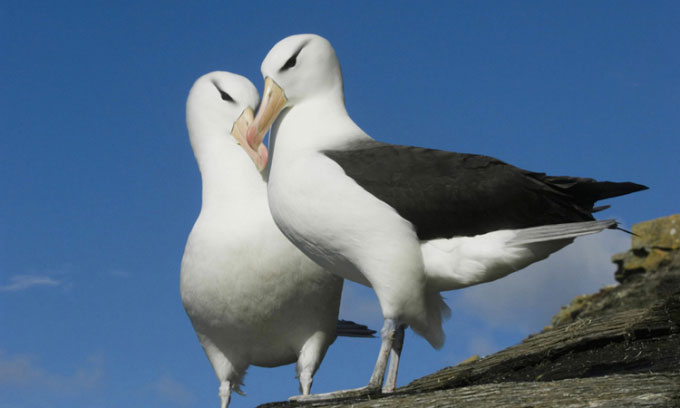The phenomenon of global warming is causing food shortages, leading many black-browed albatross pairs to become stressed and separate to find new mates.
The black-browed albatross, known for its lifelong loyalty to partners, may be “divorcing” more frequently due to global warming, according to research published in the Royal Society journal on November 24.

A pair of black-browed albatrosses courting each other. (Photo: Kevin Schafer).
Black-browed albatrosses typically bond with their partners for life. Only 1% to 3% of black-browed albatross pairs separate and seek new mates. However, this rate increases to 8% in years when water temperatures rise unusually high. Researchers reached this conclusion after analyzing data from over 15,000 pairs of black-browed albatrosses in the Falkland Islands, South Atlantic, over a span of 15 years.
Scientists have long known that black-browed albatrosses can divorce, with the rate of females seeking new mates being higher than that of males if they experience an unsuccessful breeding season. However, the research team discovered that in unusually warm years, the divorce rate among successful breeding pairs also increases. So why does warming water lead to this outcome?
Rising water temperatures mean a decrease in phytoplankton, the foundation of the marine food chain. The scarcity of phytoplankton affects the entire food web, forcing albatrosses to fly farther and work harder to find enough food. In some cases, albatrosses may fly too far and fail to return in time for the breeding season, causing their partners to seek new mates, according to Francesco Ventura, an expert at the University of Lisbon and co-author of the study.
Ventura also noted that extreme temperatures and the effort required to forage increase stress levels in the birds. They may partially blame their partners for their exhaustion. “We hypothesize that they blame each other. In this scenario, females may experience physiological stress and attribute this heightened stress to the male’s inadequacy,” he stated.
The new study was conducted on the population of black-browed albatrosses in the Falkland Islands, where the number of individuals remains abundant, and divorce is not catastrophic, Ventura explained. They still manage to find new partners after separating.
However, this could also occur in populations of albatrosses with fewer individuals, leading to significant consequences. “If it is a population with few breeding pairs, such disruptions in relationships could lead to disturbances in normal breeding processes,” Ventura remarked.


















































